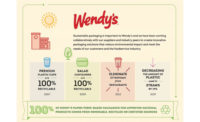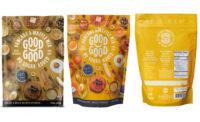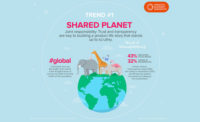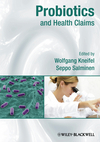2019 Predictions: Global Trends
Mintel finds sustainability, health and convenience as top 2019 trends
A new generation of modern convenience food and drink is emerging

Annie's Homegrown Honey Bunny Grahams use ingredients from a farm advancing regenerative agriculture practices.
PHOTO COURTESY OF: MINTEL GLOBAL NEW PRODUCTS DATABASE (GNPD)
Mintel predicts that modern takes on sustainability, health and wellness, and convenience will reshape the food and drink industry in 2019 and beyond.
“In 2019, Mintel foresees that as global attention on plastic waste creates a broader understanding of sustainability, brands will take a more circular approach. There is also an opportunity for product innovation that helps people of all ages proactively address age-related health concerns as healthy aging becomes more of a focus,” says Jenny Zegler, associate director, Mintel Food & Drink. “Finally, a new generation of modern convenience food and drink is emerging as manufacturers respond to rising healthy-eating priorities, quests for foodie-inspired flavors, interests in personalization and competition from speedy delivery services.”
Evergreen Consumption: This is a circular view of sustainability that spans the entire product lifecycle requires action from suppliers to consumers.
The definition of sustainability is expanding to encompass the entire life of a product. Collaboration between suppliers, manufacturers, governments, nonprofits, retailers and consumers can help to ensure sustainability extends from ingredient sourcing to package design, disposal or reuse.
Expect to see demand for more sustainability efforts from brands, such as incentivizing consumers to recycle packaging and offering upcycled goods. Efforts to improve air pollution, restore soil health and embrace regenerative agriculture will also emerge as important elements of holistic sustainability programs.
Through The Ages: Food and drink will build on today’s dialogue about wellness and transition into more solutions for healthy aging.
Healthy aging is emerging as a food and drink opportunity as consumers view health and wellness as a holistic, proactive and ongoing pursuit. More food and drink formulations can be developed for people of all ages to efficiently consume vitamins, minerals and other ingredients that are potentially beneficial for bone, joint, immune system, eye and brain health to promote longevity.
Looking ahead, food and drink manufacturers can look to the beauty industry for inspiration for healthy aging product development that rejects terms like “anti-aging” and instead addresses longevity. Expect to see more “nootropics” like L-theanine and B-vitamins that claim to enhance brain power and focus, as well as inflammation-reducing ingredients such as ginger, turmeric, green tea extract and medicinal mushrooms.
Elevated Convenience: To match the premium expectations of consumers in the on-demand age, convenience food and drink will get an upgrade.
There is a demand for nutritious and customizable products that help people keep pace with busy schedules without sacrificing health goals or curiosity for new ingredients, flavors or formats. But as connected consumers might be tempted to save time by turning to quick service restaurants or delivery, packaged food and drink brands must stay competitive with improved convenience products.
The rising segment of consumers who are often on-the-go, yet want to spend more time at home, are increasing demand for upscale packaged food and drink products that offer “speed scratch” solutions or restaurant-quality, ready-to-consume products. This will promote the expansion of meal kits sold individually at retail and a new generation of prepared meals, sides and sauces that emulate restaurant meals.
Mintel is the world’s leading market intelligence agency. Its expert analysis of the highest quality data and market research helps businesses to grow. Visit www.mintel.com to learn more.
Originally appeared in the December, 2018 issue of Prepared Foods as Food for Thought.
Looking for a reprint of this article?
From high-res PDFs to custom plaques, order your copy today!








